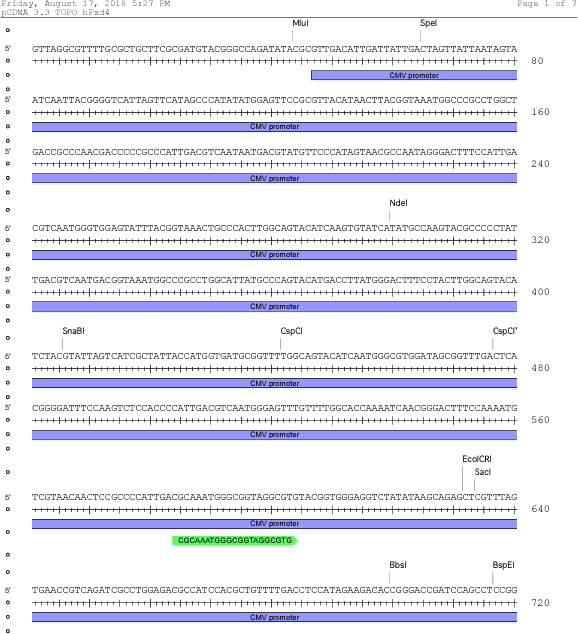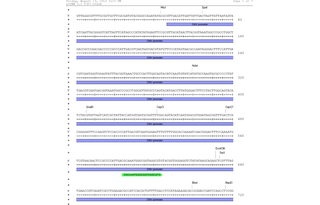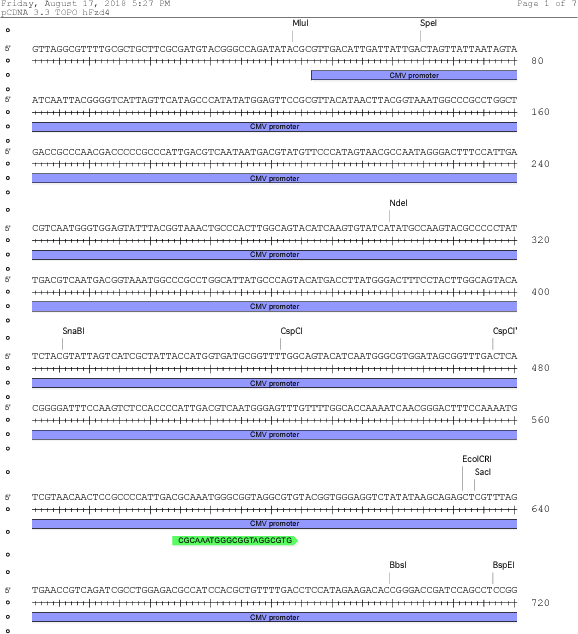pcDNA 3.3 hFZD4
(Plasmid
#115908)
-
PurposeExpresses human FZD4 in mammalian cells.
-
Depositing Lab
-
Sequence Information
Ordering
| Item | Catalog # | Description | Quantity | Price (USD) | |
|---|---|---|---|---|---|
| Plasmid | 115908 | Standard format: Plasmid sent in bacteria as agar stab | 1 | $85 | |
Backbone
-
Vector backbonepcDNA3.3 TOPO TA
- Backbone size w/o insert (bp) 5407
- Total vector size (bp) 7026
-
Vector typeMammalian Expression
-
Selectable markersNeomycin (select with G418)
Growth in Bacteria
-
Bacterial Resistance(s)Ampicillin, 100 μg/mL
-
Growth Temperature37°C
-
Growth Strain(s)DH5alpha
-
Copy numberUnknown
Gene/Insert
-
Gene/Insert nameFZD4
-
SpeciesH. sapiens (human)
-
Insert Size (bp)1619
-
Entrez GeneFZD4 (a.k.a. CD344, EVR1, FEVR, FZD4S, Fz-4, Fz4, FzE4, GPCR, hFz4)
- Promoter CMV
Cloning Information
- Cloning method TOPO Cloning
- 5′ sequencing primer CGCAAATGGGCGGTAGGCGTG
- 3′ sequencing primer CTTCCGTGTTTCAGTTAGC (Common Sequencing Primers)
Resource Information
-
A portion of this plasmid was derived from a plasmid made byImage clone 5199771
Terms and Licenses
-
Academic/Nonprofit Terms
-
Industry Terms
- Not Available to Industry
Trademarks:
- Zeocin® is an InvivoGen trademark.
Depositor Comments
TOPFlash reporter assay can be inhibited by transfection of too much of this plasmid (see Lai et al., 2017 for detailed description of transfection conditions).
These plasmids were created by your colleagues. Please acknowledge the Principal Investigator, cite the article in which the plasmids were described, and include Addgene in the Materials and Methods of your future publications.
-
For your Materials & Methods section:
pcDNA 3.3 hFZD4 was a gift from Harald Junge (Addgene plasmid # 115908 ; http://n2t.net/addgene:115908 ; RRID:Addgene_115908) -
For your References section:
TSPAN12 Is a Norrin Co-receptor that Amplifies Frizzled4 Ligand Selectivity and Signaling. Lai MB, Zhang C, Shi J, Johnson V, Khandan L, McVey J, Klymkowsky MW, Chen Z, Junge HJ. Cell Rep. 2017 Jun 27;19(13):2809-2822. doi: 10.1016/j.celrep.2017.06.004. 10.1016/j.celrep.2017.06.004 PubMed 28658627






